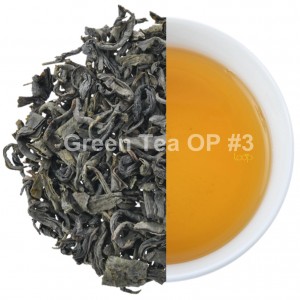Green OP #1
Green OP #2
Green OP #3
Green OP #4



 Orange pekoe also spelled pecco, or OP is a term used in the Western tea trade to describe a particular genre of black teas (orange pekoe grading). Despite a purported Chinese origin, these grading terms are typically used for teas from Sri Lanka, India and countries other than China; they are not generally known within Chinese-speaking countries. The grading system is based upon the size of processed and dried black tea leaves. The tea industry uses the term orange pekoe to describe a basic, medium-grade tea consisting of many whole tea leaves of a specific size; however, it is popular in some regions (such as North America) to use the term as a description of any generic tea (though it is often described to the consumer as a specific variety of tea). Within this system, the teas that receive the highest grades are obtained from new flushes (pickings). This includes the terminal leaf bud along with a few of the youngest leaves. Grading is based on the "size" of the individual leaves and flushes, which is determined by their ability to fall through the screens of special meshes ranging from 8–30 mesh. This also determines the "wholeness", or level of breakage, of each leaf, which is also part of the grading system. Although these are not the only factors used to determine quality, the size and wholeness of the leaves will have the greatest influence on the taste, clarity, and brewing time of the tea. Pekoe, thus, refers to the younger leaves that are still covered with white hairs. Any pekoe tea may include the bud and first two leaves and it refers to the highest grades of tea. A grade higher, Orange Pekoe, will contain only the first leaf, and the Flowery Orange Pekoe will have buds too.
Orange pekoe also spelled pecco, or OP is a term used in the Western tea trade to describe a particular genre of black teas (orange pekoe grading). Despite a purported Chinese origin, these grading terms are typically used for teas from Sri Lanka, India and countries other than China; they are not generally known within Chinese-speaking countries. The grading system is based upon the size of processed and dried black tea leaves. The tea industry uses the term orange pekoe to describe a basic, medium-grade tea consisting of many whole tea leaves of a specific size; however, it is popular in some regions (such as North America) to use the term as a description of any generic tea (though it is often described to the consumer as a specific variety of tea). Within this system, the teas that receive the highest grades are obtained from new flushes (pickings). This includes the terminal leaf bud along with a few of the youngest leaves. Grading is based on the "size" of the individual leaves and flushes, which is determined by their ability to fall through the screens of special meshes ranging from 8–30 mesh. This also determines the "wholeness", or level of breakage, of each leaf, which is also part of the grading system. Although these are not the only factors used to determine quality, the size and wholeness of the leaves will have the greatest influence on the taste, clarity, and brewing time of the tea. Pekoe, thus, refers to the younger leaves that are still covered with white hairs. Any pekoe tea may include the bud and first two leaves and it refers to the highest grades of tea. A grade higher, Orange Pekoe, will contain only the first leaf, and the Flowery Orange Pekoe will have buds too.